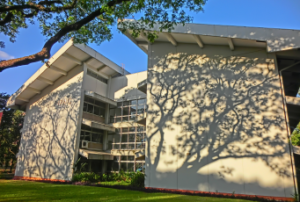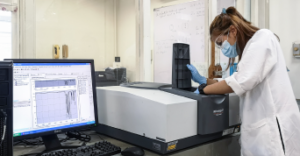This article is originally published in S&T Post:
Guidote, A.M. (2022). PIPAC – the Philippines’ Most Successful Spin-Off and Academe-Industry-Government Collaboration. S&T Post, 40(3), 34-35. Retrieved January 4, 2023, from https://www.stii.dost.gov.ph/images/jdownloads/pdf_files/sntposts/3Q-2022_STPost_8_as_of_Dec28.pdf
The Philippine Institute of Pure and Applied Chemistry (PIPAC) is a not-for-profit scientific organization that is a government-registered corporation with the aims of providing chemical and microbiological testing, capacity building, research & development, and technical consultancy to Philippine industries as well as international clients. PIPAC serves everyone – the academe, government, agencies, private individuals, and industry whether small, medium-scale, or large national or multinational corporations.

In the 1960’s there were no third party testing laboratories in the Philippines which industry needed. Many companies sought the assistance from the Department of Chemistry of the Ateneo de Manila University. The faculty members – Dr. Modesto T. Chua, Dr. Amando Kapauan, Fr. William Schmitt, S.J., Dr. Ana Javellana, Mr. Balalta, and others discussed about putting up a separate entity from the Department of Chemistry as a collaboration and handle third party testing and other needs of academe, industry, and government.
When Dr. Chua went to return to Germany for a post doctoral assignment he had good opportunities of interaction with the Alexander von Humboldt Director General, Dr. Heinrich Pfeiffer. He discussed with him the Department of Chemistry’s plan of putting up a separate institute to serve the public. Dr. Pfeiffer liked the idea as this academe-industry-government collaboration is successfully implemented in Germany. He asked Dr. Chua to submit a proposal. The proposal for the “Installation of the Institute for Chemical Analysis, Applied Research and Technical Training” was approved.
In December of 1972, PIPAC was incorporated with substantial funding for equipment from the Alexander von Humboldt Foundation and the Ministry of Economic Cooperation of the Federal Republic of Germany. It is said that up to today, considering inflation, this is the biggest grant ever given by the Alexander von Humboldt Foundation. PIPAC was registered in the Securities and Exchange Commission in 1973. PIPAC was housed in the Chemistry Building of the Ateneo de Manila University with a laboratory and an office. Dr. Modesto T. Chua was PIPAC’s first Institute Director.
Over the next years, PIPAC made requests for funding for an equipment and a separate building from the Japan International Cooperation Agency (JICA). With the collaboration from government agencies, which are now the Bureau of Product Standards and the Department of Trade and Industry, a JICA grant was secured. The present PIPAC building was inaugurated in 1984 on land provided by the Ateneo de Manila University. Other major donors were the Philippine Manufacturing Corporation (Procter & Gamble Philippines, Inc.), Philippine Refining Company (Unilever Philippines, Inc.), and Filipinas Synthetic Corporation.
PIPAC is an ISO/IEC 17025 Laboratory. As such, analyses done in PIPAC adhere to the highest standards and are recognized all over the world.
An Academe-Industry-Government (AIG) Collaboration
PIPAC is managed by faculty members of the School of Science & Engineering of the Ateneo de Manila. Dr. Armando M. Guidote Jr. (Professor, Department of Chemistry) is the present Institute Director. Dr. Ronaldo M. Fabicon (Associate Professor, Department of Chemistry) is the Head of Analytical Services. Dr. Crisanto M. Lopez (Associate Professor, Department of Biology) is the Head of Microbiological Analysis. Dr. Giselle Grace Lim Co Yu Kang (Assistant Professor, Department of Chemistry) is the concurrent Head of R&D and Head of Trainings. Dr. Armando Jerome De Jesus Jr. (Assistant Professor, Department of Chemistry) is the Quality Assurance Manager. The non-faculty administrators are Mrs. Thelma Jane Parrenas, the Head of Operations, and Mrs. Cristina Portilla, the Laboratory Manager. Dr. Ian Ken Dimzon (Assistant Professor and Chair of the Department of Chemistry) is a consultant of PIPAC.
PIPAC provides analysis and capacity building to researchers and students from many education institutions. Among those that PIPAC has worked with are the University of the Philippines (Diliman and UPLB), De La Salle University, University of the Bahamas, the Philippine Science High Schools, Xavier University, …
PIPAC serves the industry for their various testing needs for metals and minerals analysis, pharmaceutical finished products and raw materials, food, disinfectants, drinking water and other beverages, gases, soil, fire extinguishers, blood and other human samples, pipes and other industrial products, lakes/rivers and sea water, and many more. PIPAC is instrumental in assisting small- and medium-scale enterprises that have no analytical laboratories to support their quality and safety assurance requirements. On the other hand, PIPAC supports big industry that despite having their own laboratories still have so many samples that need analysis. PIPAC also assists industry for their R&D needs in product, process, and method development. PIPAC is a sought-after troubleshooter and problem solver of industry.
PIPAC is a partner of government in fulfilling its mandates. PIPAC through the years has supported and continue to support the following agencies: Department of Trade and Industry (Bureau of Product Standards), Department of Health (Food and Drug Administration), Department of Agriculture (Bureau of Animal Industry, Philippine Rice Research Institute, and Pesticides and Fertilizer Authority), Department of Environment and Natural Resources (Environmental Management Bureau and Mines & Geosciences Bureau), and the Department of Science and Technology. PIPAC is a proud member of the DOST OneLab.


PIPAC is guided by a Board of Trustee that mirrors PIPAC’s Academe-Industry-Government collaboration. The trustees are headed by the Chair, Mr. Alberto Manlapit who has a long industry experience with Procter & Gamble, San Miguel Corporation, and United Laboratories, Inc. The Vice-Chair is Fr. Antonio “Ting” Samson who was former President of Ateneo de Davao University and Xavier University in Cagayan de Oro. The other trustees are Dr. Ma. Assunta C. Cuyegkeng (Professor), Dr. Fabian M. Dayrit (Professor), and Dr. Raphael Guerrero (Professsor and Dean of School of Science & Engineering), represent academe and are all from the Ateneo de Manila University. From Industry, there is Mr. Meneleo Carlos Jr. (President, RI Chemicals, Inc.), Mr. Dean Lao Jr. (Managing Director, Chemrez Technologies, Inc.), Mr. David Lim (Chief Sustainability Officer, Universal Robina Corporation), and Mr. Benel Lagua (former Executive Vice President of the Development Bank of the Philippines). Government is represented by Dr. Rafaelita Aldaba (Undersecretary of the DTI).
This 2023, PIPAC will be celebrating its 50th year. PIPAC has withstood various challenges in the Philippines’ history – political, economic, financial, etc. It has become stronger because of the AIG collaboration. Today, there is much talk about start-ups and spin-offs and the many challenges that they face. PIPAC was there before in 1973. It was really a start-up or a spin-off even before those terms were coined. PIPAC is a reminder to everyone that with passion, dedication, and collaboration, success can be attained.
PIPAC moves on to the next 50 years, proud of the valuable services it provides. PIPAC is grateful for the trust from its partners and collaborators, especially the major donors who invested in PIPAC: the Alexander von Humboldt Foundation of the Federal Republic of Germany and the Government of Japan through the Japan International Cooperation Agency.
